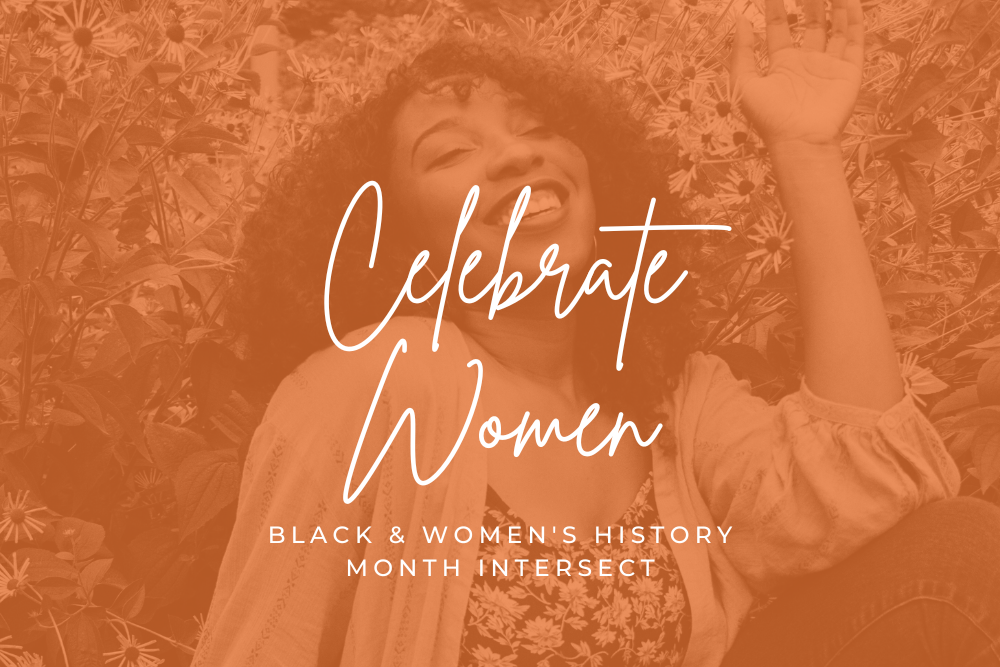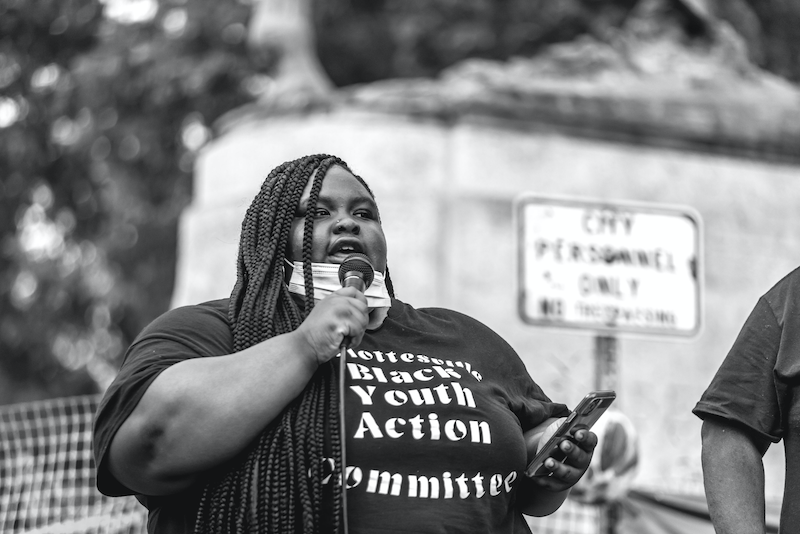
“I have read book after book and watched countless documentaries about the political implications of the fall of these monuments. Too many of them never mention the names of the Black women who were essential in making it all happen. It is morally bankrupt and intellectually dishonest to tell a story that leaves Black women like myself out of the narrative.”
–Zyahna Bryant, Teen Vogue

Learn more about Zyahna Bryant, including her activist work and published book “Reclaim” including essays, poetry, and other work.
In this article:
- “Undooming” the Repetition of History
- Give Credit Where Credit’s Due (social movements, creative genius + technological advances)
- A New Way Forward: Repairing the Harm
“Undooming” the Repetition of History
Falsified credit. Withheld acknowledgement. Missing attribution. Stolen ideas, products, and creations. Erasure. Overlooked details. These professional, creative and academic crimes occur far too often without culprits being held responsible. These are disturbingly skewed to the cost of POC–especially women. As we meet at the crossroads between Black History Month and Women’s History Month, we’re stopping to yield and give the right-of-way to incredible Black women who have paved the way for many of the discoveries, policies, wisdoms, justices, technology and more that society benefits from today.
An important aspect of building up anti-racism and feminism efforts is learning how to spot such inconsistencies and to speak up when appropriation does occur. Effacing Black names is unfortunately a continuing practice, and we’re here to call it out. It’s not by any means new, but just because “it’s always happened” doesn’t mean it can’t or is too monumentous to be changed. Now with the world wide web being a modern human’s necessity (you know, food, water, shelter, clothing, sleep, internet), luckily for us, it’s become a little easier to uncover these injustices and discover alternative narratives to the one that the Man wants us to overlook.
So here we are, looking to…
BACK TO TOP
Give Credit Where Credit’s Due
The names of Sojourner Truth, Harriet Purvis, and Maria W. Stewart are well-known. These Black women were cornerstones of the Women’s Suffrage Movement at the turn of the twentieth century, even though they were forced to march separately from the white suffragettes. Despite this recognition, there are many more Black women that have backboned some of the world’s most pivotal social justice movements who have had their contributions whitewashed or whited-out. Rectifying that with a little retraining makes truth out of our past and lends a genuine approach to our future.
Social Movements
The Script:
Activist Rosa Parks took the first stand–well, seat–against public transit segregation laws.
The True Story:
Nine months before Parks’ actions tipped the scales into the bus boycott in Montgomery, AL in 1955, a teenager had done the same thing in the same city and bus line. 15 years old at the time, Claudette Colvin refused to give up her bus seat before being arrested and removed by police. Inspired by it being Negro History Month and her recent learnings about Harret Tubman, Sojourner Truth and other Black women who fought for justice, Colvin took it upon her young shoulders to stand up in the fact of inequitable policies and laws.
The Script:
Actress Alyssa Milano used her Twitter and fame to urge women who had experienced abuse to join the movement in supporting victims of sexual violence by publicly sharing “#MeToo,” and their stories, in 2017.
The True Story:
Women’s Advocate Tarana Burke coined the #MeToo phrase in 2006 with an aim to empower women who had endured sexual violence. The hashtag brought solidarity to women, letting them know they weren’t alone. The well-meaning post from Milano sparked a revolutionary spirit, and within 24 hours, the phrase had traveled world-wide and moved millions. Graciously, as soon as the actress caught wind that she wasn’t the first, she made quick work to properly source Burke as the pioneer.
Creative Genius
The Script:
60 Minutes ran a story about racial bias in facial recognition and credited Patrick J. Grother as the featured scientist for the discovery.
The True Story:
Before you ask, this is not The Onion. The episode was spotlighting, and practicing, racial bias. The story failed to mention three Black women who were the primary contributors of seminal research to the project: Joy Buolamwini, Timnit Gebru, and Inioluwa Deborah Raji. This was done after the show’s producers spent time with Buolamwini before the episode was aired where she had recommended people, studies, and a misidentification case of Robert Williams who had been falsely arrested because of facial recognition shortcomings to reference for the show. Oh, and she built a custom demo for host Anderson Cooper to use to show how facial recognition analysis works. Not only were these names left off, but the only name the show featured was Patrick J. Grother whose study claimed “motivation” from Raji’s research and Buolamwini’s MIT master’s thesis.
Technological Advances
The Script:
NASA lands on the moon and wins the race to space thanks to the men of science.
The True Story:
The “Rocket Girls” of NASA are finally starting to receive recognition for their contributions, yet all of those names being shared for a long time lacked any color. A group of Black women, referred to at NASA as the “West Computers” for where they were geographically segregated to work, fought tooth and nail to be seen as equals in their industry while making monumental contributions. Some of these women included:
- Christine Darden, advanced super-sonic flight
- Katherine Johnson, calculated Apollo and Mercury missions
- Miriam Mann, persisted in removing the “Coloured Computers” sign that would be placed on their table every day… until one day, it stopped being replaced
- Melba Roy, leader of human computers that tracked the Echo satellites in the 1960
If you’re looking for a meaningful treat to indulge in, you can watch this story unfold in the movie Hidden Figures, a dramatization about the Black women who made winning the space race possible for the USA in the 1940s based on Margot Lee Shetterly’s novel.
Further reading about Black women today who are rocking it: The 10: These Black Women in Computer Science Are Changing the Face of Tech
BACK TO TOP
A New Way Forward: Repairing the Harm
This is just a miniscule list of positively incredible Black women who deserve recognition. The evidence is indisputable and mountainous: Black women have historically been left out of association with their accomplishments, and we barely scratched the surface. Black artists, musicians, inventors, innovators, and more all have their own “hidden figures.” While we can only do so much to right these past transgressions that also robbed our society of enriching truths, we can do our part in fostering a more equitable, healing society with a brighter future.
There is much work to be done to denormalize this type of erasure, appropriation, and theft, and that starts with holding one another, ourselves, and our industry, accountable. Repairing the harm is the first step to cleaning up. The intentions could be good, bad, or even kind–but whether or not you intended to knock over the vase, the fact of the matter is that it is still broken. Harm was still inflicted. How you choose to move forward is defining: you can gain a lot of respect by acknowledging what has happened without justification. Once you own up to the error, you OWN the error. You get to decide the narrative from here. Take one from Alyssa Milano–readjust the angle of that spotlight to where it rightfully should shine.
“Those who have engaged in misappropriation must ask themselves this: how does the Black woman I have stolen from want this harm to be repaired?”
– Janice Gassam Asare, Forbes Senior Contributor

Tune in next week for more news coming atcha from the Wolves’ Den!





